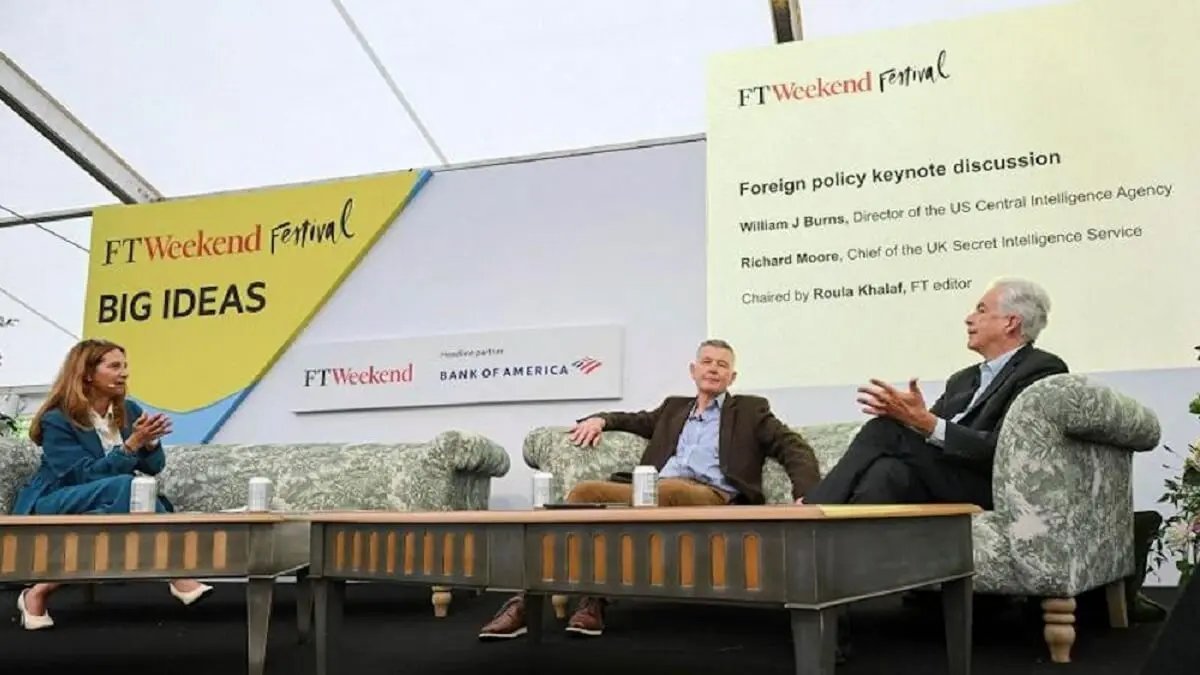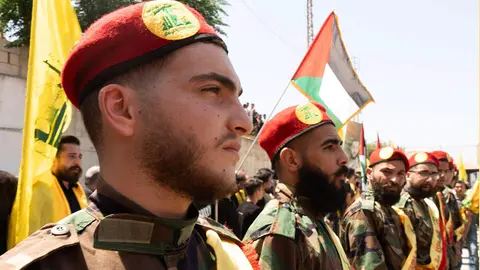What Burns and Moore failed to tell us

The region would not have been in its current state of turmoil had it not been for the failure of Western policies and their inconsistency and complacency in dealing with Iran.
It would be difficult for CIA and MI6 analysts to deny that as developments were unfolding before their very eyes in Gaza there were enough indications that it all could only lead to an outcome known as “Al-Aqsa flood.”
It is difficult to guess why the heads of the US Central Intelligence Agency (CIA), William Burns and Britain’s MI6, Richard Moore, chose to co-author an op-ed in the Financial Times and then to appear with reporters in the so-called FT Weekend festival in London.
The op-ed and the joint public appearance are unprecedented in the world of spooks, usually more associated with secrets and covert activities than with statements and public revelations.
There is no doubt that their joint appearance is a reminder of the depth of the “special relationship” between the United States and Britain, two countries that have fought together in every war in modern history, with the exception of the British abstention from taking part in the Vietnam War.
It is difficult to say how much this appearance was intended to be a public relations event and how much it was motivated by a more far-reaching purpose. It is likely that the deep states in both countries wanted to reaffirm the role of the spy agencies as solid institutions and not just as intelligence tools providing political leaders with cover, as was the case with the Iraqi weapons of mass destruction issue two decades ago.
Former US President George W Bush and former British Prime Minister Tony Blair may not have been of the type of populist leaders that were later to overtake politics. However, the image of the established state and its deep-rooted tools, especially security and intelligence institutions, was further shaken beyond the Bush-Blair era, when leaders, such as former US President Donald Trump and former British Prime Minister Boris Johnson, came to power.
All state agencies appeared then to be vulnerable to the mood swings of such populist leaders. Intelligence agencies in particular, which are shielded by secrecy, needed to boost their credibility. Unfortunately, there was no easy way to enhance confidence in these agencies whose work depends on secrecy. So the solution was to resurface from the covert world and meet the public gaze.
What concerns us particularly here from what the two American and British spy chiefs have said is what related to the Middle East and Iran. But before addressing what was said about the region, it is necessary to point out what both Burns and Moore saw the most serious threat in the rise of China as a global power with great capabilities, requiring the allocation of 20 percent of the intelligence agencies’ budgets and human capabilities. After that, there is the risk of Russia sparking a conflagration in its vicinity or provoking its self-induced implosion.
In both cases, the outcome would be catastrophic. The two spy chiefs’ assessment stems at least in part from the consideration that President Vladimir Putin is a “former” member of their own profession.
Intelligence officers are not usually known for easily abandoning their goals. Putin had deserved particular scrutiny in the past, which he did not receive. Because of that intelligence flaw, the world is faced today with a raging war in Ukraine.
Burns and Moore who now head the two most important Western intelligence agencies, are diplomats and politicians. But what distinguishes them most is that they have extensive knowledge of the Middle East. If they were only diplomats, it would be expected from them to be evasive in attempting to explain the situation in the Middle East today. A diplomat can find many explanations that do not commit him to anything while a politician selectively picks the evidence that buttresses his arguments and ignores the rest. An intelligence officer has no choice, however, but to actually acknowledge what happened. But this is not how the heads of the two intelligence agencies dealt with the issues before them.
The region would not have been in its current state of turmoil had it not been for the failure of Western policies and their inconsistency and complacency in dealing with Iran, if not its occasionally favourable treatment of Tehran.
Iran has been able to take advantage of Western failures and of every case of international or regional hesitation.
When the withdrawal of the PLO forces from Lebanon left a vacuum following the Israeli invasion, Iran made sure Hezbollah filled that vacuum. It did so in plain view of the West even though it was mired in its war with Iraq. It shored up Hezbollah by terrorising the Lebanese, scaring away US Marines, colluding with Syrian forces and, benefitting from the lack of Arab response, eventually transforming its Lebanese proxy into a major force in the region.
Two other cases of vacuum emerged in Yemen and Syria as a result of circumstances or the partial consequence of Iran’s actions. These factors enabled Tehran to ensure a strategic presence in places where it once never dreamt of having a foothold. Tehran would not have been present in Iraq, the crown jewel of Iranian influence in the region, had it not been for the invasion of Iraq by the West and the United States in particular, and had it not been for the type of the administration of Iraq after the fall of Saddam Hussein’s regime, which made things worse.
What happened in Iraq in particular leads many Arabs to believe that it was all part of some joint American-Iranian plan.
Iran benefited from sectarian realities in Lebanon, then in Yemen, Syria and Iraq. But with certain Palestinian factions it created a relationship of allegiance that transcended sectarian considerations. The Shia Iran used the Israeli-Palestinian conflict to cross comfortably to the Sunni Hamas, i.e. Muslim Brotherhood.
It would be difficult for CIA and MI6 analysts to deny that as developments were unfolding before their own very eyes in Gaza there were enough indications that it could all only lead to an outcome known as “Al-Aqsa flood.”
There was no other reason for the construction of all those tunnels and the launch, so many times, by Hamas of rockets from Gaza towards targets in Israel in what looked like preliminary training exercises for the war that eventually erupted on October 7, 2023.
The directors of the top intelligence agencies in the world cannot talk about the complex realities in the Middle East and their inherent dangers while ignoring the fact that their own countries had a hand in shaping these very same realities and their complexities. There were Western interventions in favour of Iran in every crisis. What happened in Iraq is the clearest example of an orderly process of transition of power.
Was the West unaware of Iranian missiles and drones reaching Hezbollah, Hamas and the Houthis when it talks about the dangers of proliferation of these weapons and the threat they constitute to regional security and maritime shipping?
Is it difficult to understand that the boycott of the Palestinians by the West has left them between a powerless authority in the West Bank and the total control of Iran-backed Hamas in Gaza?
Burns sat down many times during truce negotiations with Qatari and Egyptian mediators trying to convince Israel and Hamas of the necessity of reaching a truce. Did he have the slightest doubt that he was in fact negotiating with Iran?
What is the threat of a wider regional conflict expansion that Burns and Moore are talking about other than the threat that their countries and the West in general have helped create by giving Iran the benefit of the doubt?
It is said that the fairy tales that people tell are often similar. Grandmothers often sit and tell their grandchildren big bad wolf stories. These are tales that are full of excitement and fear, but they are told by grandmothers to instil children with a certain type of awareness. The two “grandmothers,” Burns and Moore, sat in the centre of London trying to instil in us fear of the Iranian big bad wolf whose eyes betray evil intent.
Haitham El Zobaidi is the Executive Editor of Al Arab Publishing House.



